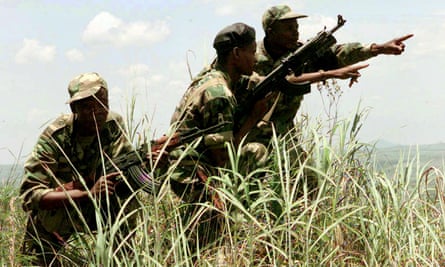Donald Trump’s campaign chairman took a “mercenary” approach to lobbying the US government on behalf of international clients accused of killings, rapes and other atrocities, according to one of his former colleagues.
Manafort was a principal at the lobbying firm Black, Manafort, Stone and Kelly, which had close links to the Ronald Reagan and George HW Bush administrations, as well as senior Republicans in Congress.
In that role, in 1989, he had no qualms about doing business with the “murderous dictator” of Somalia, Washington lobbyist Riva Levinson recalls in a new memoir, Choosing the Hero: My Improbable Journey and the Rise of Africa’s First Woman President, which focuses on her work with Liberia’s Ellen Johnson Sirleaf.
“Arrogant, narcissistic, egotistical, brilliant – all of that I can handle in Paul,” Levinson writes. “But it is Paul’s mercenary attitude that puts us at odds.”
In an interview at her office on K Street in Washington last week, Levinson told the Guardian: “Paul is brilliant and he’s one of those people that can put together a strategy at 30,000ft and then execute with precision at the detail of a chess game. From Paul I got probably a remarkable skill set, but from Ellen I got my bearings.”
Now 67, Manafort has been hired as chief strategist to mastermind an improbable victory for Trump in November’s presidential election. He has been a key player in placating anxious Republicans on Capitol Hill.
“He’s gonna win,” Manafort told the Huffington Post last week. “He’s gonna win unless we – meaning people like me – screw it up. This is not a hard race.”
Critics say the unsavoury international clientele of Black, Manafort, Stone and Kelly added up to a “torturers’ lobby”. Asked if Manafort has a moral compass, Levinson replied: “I don’t know what drove Paul. We don’t know what really drives anyone.
“The baseline decision that the firm always made – and I know this even though I was only 25 years old and kind of at the lowest level – was: ‘Will the US government, will US policy support this project?’ That was always the baseline of the firm and what they did.”
In her book, Levinson describes landing a job with Manafort in 1985, when she was young and had no political connections, as her “big break”. At her job interview, she told him she was fearless: “And there’s no place I won’t go!”
She writes: “I became Manafort’s Third World traveler of choice.”
That included Somalia, where the military ruler Siad Barre had been accused, in the words of one official report, of presiding over “summary killings, arbitrary arrest, detention in squalid conditions, torture, rape”. In one of Africa’s many proxy conflicts during the cold war, he was also seen as a US ally against the Soviet Union.
Levinson writes: “‘Are we sure we want this guy as a client?’ I asked Manafort, in a garish display of first-mission naiveté.
“Manafort sounded agitated, as if I had asked the right question at the wrong time. ‘We all know Barre is a bad guy, Riva. We just have to make sure he’s our bad guy. Have a great trip.’”
Levinson was supposed to get Barre to sign a $1m contract – with $250,000 up front and the rest to be wired later – for Manafort to represent him in Washington. But, writing in the present tense, she claims she had moral doubts.
“It’s one thing if you’re pitching competing brands of toothpaste to the American consumer. But it’s another if your clients are players in a global struggle against communism and the consequences of their actions – and yours – can impact thousands of lives. I have to believe in what I’m doing, and I have to believe it’s something for the good. That’s ingrained in my psyche.
“It is also what Manafort predicts will be my downfall in this business.”

The trip to Mogadishu was a flop, with a guide failing to show up and calls to Barre and his associates going unreturned before food shortages, illness and a swarm of mayflies prompted a panicked exit as Barre fled advancing rebels.
Writing about her flight out, Levinson recalls: “I realize now that to men like Manafort, the world really is one huge game of Stratego, and he plays to win. The consequences are secondary. He sent John [her colleague] and me on this wild goose chase, this utterly pointless mission, one that could have killed us both, simply because he could.”
Somalia descended into anarchy, and a few years later, the intervention of US special forces led to the infamous “Black Hawk Down” incident. Barre died in exile in Nigeria in 1995.
‘One of those rare individuals who can cut through the noise’
Manafort’s lucrative client list has drawn much scrutiny. In 1985, his signed a $1m contract with a Philippine business group to promote the autocrat Ferdinand Marcos, a few months before Marcos was toppled and fled the country. In 1989, according to the Washington Post, he was hired to massage the image of the despot Mobutu Sese Seko of Zaire (now Democratic Republic of the Congo) for $1m a year.
In the mid-1990s, Manafort reportedly received almost $90,000 from a Lebanese-born businessman and arms dealer to advise French presidential candidate Edouard Balladur – a payment that surfaced as part of a French investigation into an arms sale of French submarines to Pakistan. In 2010, he helped pro-Russian Ukrainian candidate Viktor Yanukovych rehabilitate his reputation and win a presidential election.
Levinson worked with Manafort for a decade but is no longer in touch with him. She writes: “Over 6ft tall with large brown eyes, a stocky build and dark Italian features, Manafort isn’t good looking, precisely, but he does have a commanding presence that compels you to notice him when he walks into a room. He is one of those rare individuals who can cut through the noise, unerringly get to the heart of a problem and hit on a solution.
“Inside the firm, we joke that working at BMS&K is like playing one big game of Stratego: building armies and scheming to take over the world. That is exactly what it feels like working with Manafort. In fact, at times, that is exactly what is going on.”
Now, Levinson describes herself as a “distraught Republican”, unsure whom she will vote for in the presidential election. But she describes Manafort as a “clever hire” by Trump.
“I don’t know if he can win it for Donald Trump,” she said. “I don’t know if anyone can speak to this electorate. Nobody knows what they’re dealing with.”
In her globetrotting role for Manafort, Levinson also went to Equatorial Guinea in what she says was an attempt to encourage multiparty democracy. President Teodoro Obiang Nguema is now the longest-serving leader in Africa, having held power since 1979.
She also went to Angola in 1992, for an election that did not achieve success. The National Union for the Total Independence of Angola (Unita), led by Jonas Savimbi, had the support of the apartheid government of South Africa and, with Manafort’s assistance, had received aid from the Reagan administration.
Unita had been at war with the Marxist MPLA (Popular Movement for the Liberation of Angola) government since 1975, when Angola won independence from Portugal, until shortly before the free elections in 1992. Unita lost the vote and went back to war, raising questions over the ethics of backing Savimbi.
In 2002, Human Rights Watch’s world report said: “Unita stepped up hit-and-run tactics against civilians. Rebels used terror as a policy, to obtain supplies and coerce and intimidate civilians. Indiscriminate killings, mutilation of limbs or ears, and beatings were used by rebels to punish suspected government sympathisers or as a warning against betraying Unita.
“Unita continued to forcibly recruit men and teenage boys to fight. Girls were held in sexual slavery and used as a source of forced labour.”
‘A pretty good return on our investment’

Manafort’s role in Angola was praised by Jardo Muekalia, 57, a former guerrilla fighter who joined Unita aged 16 and is now based in Washington. He first met the lobbyist in 1986, when Manafort’s firm was hired by diamond-rich Unita to secure US assistance that would “level the playing field” in the war against the Soviet-backed MPLA.
“In those days, there was a very sharp cold war environment,” Muekalia recalled. “The reason [Manafort] was looked for … was because of his access to the Reagan administration. He had access to a lot of high officials, including the president himself.
“In my first meeting with him, I was impressed ... with the level of political analysis and most importantly the ability to strategise on how to get into the Washington power structure. If I had to point to one strength he has, it was his ability to look at the overall situation and then come up with a strategy to reach the goals he defined.”
The hire worked well for Unita, Muekalia added. Manafort secured a meeting for Savimbi with Reagan and Congress approved funding until the elections in 1992.
“We were paying $600,000 [to Manafort], but we ended up getting up $40m over a period over four years, so it was a pretty good return on that investment. And you cannot really assess the political value of having Washington diplomatically involved in that effort to bring peace and bring the parties to a negotiating table.”
Elias Isaac, Angola country director at the Open Society Initiative for Southern Africa, argued that Angola was a victim of the cold war in which lobbyists played a part. “PR businesses are there to exploit situations and make money out of it,” he said. “They are not charity organisations, so they help themselves by becoming millionaires. Did Angola benefit? I have serious doubts.
“I am sure that the US benefitted because both Namibia and South Africa became independent and Angola still has one of the most ruthless regimes in the world which does not respect human rights and does not believe in effective democracy. I would invite Paul and Riva to come to Angola and make their arguments here so that we understand on what basis are they saying these crazy fallacies.”
Muekalia, a US citizen, said he would have trouble voting for Trump because of his positions on race relations and foreign policy. But he added: “The Paul Manafort I knew has a moral compass.
“My expectation is that his coming onboard this train is going to have a positive impact on Trump’s leadership.”

Comments (…)
Sign in or create your Guardian account to join the discussion